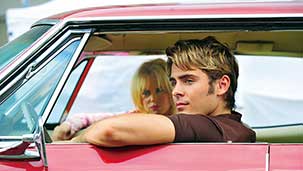I'd like to know what the panic in director Lee Daniels' voice sounded like when he assembled the team for additional photography on The Paperboy. Because - and I'm taking a bit of a guess about the additional sound you mixed - but I'm willing to bet that it was Macy Gray's voiceover.
There are two things that lead me to this conclusion: first, the movie would make no sense without her explaining - in convenient bullet-point style - every plot incident that Daniels forgot to actually show.
And second: the voice over itself makes no sense. Like, at all.
Let me incept you for a moment: Gray's character, Anita, is being interviewed about a book; a book written about the events surrounding a Sherriff's murder in 1969. This is three minutes into the film.
She's a maid in the Jansen home, where Patriarch W.W. (Scott Glenn) and his son Jack (Zac Efron) run a local newspaper in a backwater Florida town. Semi-famous Miami Times writer (and fellow family member) Ward (Matthew McConaughey) returns with his writing partner Yardley (David Oyelowo) to investigate the aforementioned murder. This is all initiated by Charlotte Bless (Nicole Kidman), a serial correspondent of death row inmates, convinced that Hillary Van Wetter (John Cusack) is innocent.
So, how does Anita fit into all of this? She doesn't, actually. Her character seems to exist as a conscience for Jack--and, of course, to provide some commentary on race relations in 1960s Florida. As a narrator, though, she does some pretty amazing things. Her insights into the story and the characters are near-omniscient. Based on what she recounts, she can do the following (described here in in convenient bullet-point style):
- Accurately describe events she was not present for, and could not possibly know about
- See inside character's minds, including dream sequences and emotional reactions to events
- Directly address the audience watching the movie
It's a shame that Daniels forced you to mix in all of this expositional nonsense, because, without it, the film might have been a lot more interesting. What could have worked as a Goddard-like exercise in storytelling - treating elliptically what is traditionally considered vital in terms of tone, character, and narrative - instead reveals a director too timid (or incompetent) to tell the story as originally filmed.
In the process, a number of good performances (Kidman, McConaughey, and Cusack) don't amount to much. It seems that Daniels used you compromise his own vision, and I like that version of the film a whole lot more.
Disappointingly,
Casey







